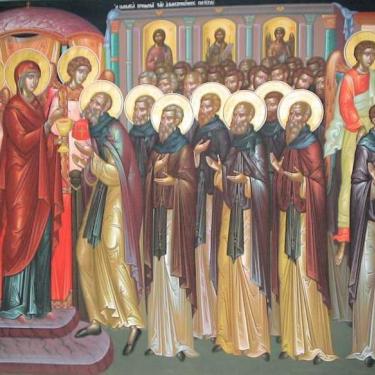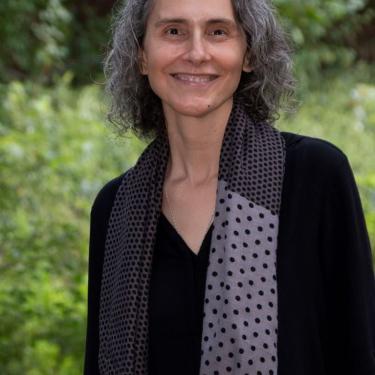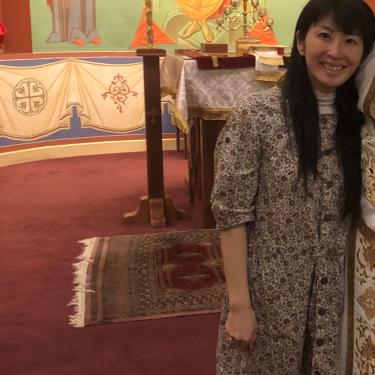
Thanksgiving and Giving Tuesday are coming soon! We thought we'd ask three of our former Women of the Week to write about their approaches to giving over the next few days. Here is Ioana Popa, a psychiatrist and spiritual director, about having a money mindset in the time of COVID:
"Giving Tuesday and Holidays are around the corner, and some people are happy to give and donate, but most people cringe 'No, please do not ask me to give money again. I don’t have enough for myself, let alone give to others. And it is COVID time - I am not sure I will make it through next week or next year, especially if we will have another lockdown.' If that is you, you are not alone my friend. And there is some truth to this, and there is also a cultural mindset that is keeping us locked into fear.
"The widespread subconscious belief perpetuated by our consumerist 21st-century culture is that we live in scarcity and therefore having money is our solution. We need money for bills, to pay for our kids, to go to vacation, pay the mortgage, pay our debt etc. Often it never feels enough, and we often grasp for more. Some have tons of money, some not - how unfair the world feels at times! With the holidays coming, the idea of buying gifts or donating money can feel like an added burden, as many of you might barely make it from month to month. And now during COVID, you might have lost your job or worrying about what might happen today or tomorrow. Fundamentally our lives revolve around money, as the symbol of what we want and seek. and underneath it is the ultimate fear, 'What if I don’t have enough?”.
"But what does money really mean at the core? If we peel layers of centuries we can trace backwards the plastic credit cards to real paper money (that was not too long ago!), then to coins, we go back to exchanging products, time, and services. At its core, money is a mix of livelihood of human value, time, creativity, love, inspiration, sweat, effort, passion, and natural resources. If we stop and think for a moment, we realize that as humanity as a whole we still live in an abundant world and actually not in scarcity. Fundamentally the problem is not about limited resources, but about the blocks in the flow of those resources.
"There are many layers and levels of resources and blocks of their flow in the world, and the situation is not an easy one. But because the situation is so complex, you might be wondering what you can do as an isolated individual to have an impact in the world? On a personal level, dealing with the complexities of COVID, politics, divisions, and polarities in our country and in the world, it is very easy to feel helpless and that the only option is to grasp for more in order to make sure we have enough before the next lock-down. But we actually have more choices.
"On an individual level, the power lies in the ability to stop and question ourselves of our assumptions. Do I really live in scarcity’? Is this really true, or is it a cultural economic drive that makes us buy more and more? Do I really need that new iPhone when the current one is still working? Do I really need that 10th (or 20th) pair of shoes, dress or pants? Do I really need to upgrade my kitchen now only to throw away good furniture? Or could I start enjoying what I have, even if not perfect, and could I start sharing a bit and bless others with some of my resources, no matter how small? And paradoxically giving money now is even more important, as other avenues of giving and sharing are blocked due to social distancing.
"Can you imagine the power of a little bit of giving multiplied by millions and billions of people? When we choose to give to others, we open the flow of energy, resources and connections with each other and we honor each other's livelihood. When we choose to freely give, others might feel inspired, might regain hope in humanity and they might choose to give as well. It all starts with each of us and our mindsets. And the end of 2020 could be an amazing one, not only because vaccines might be coming along, but also because, as humanity, we can come together on our own accord and give, donate, and share a bit from our livelihood and bring hope that we care for each other. Let’s be generous and keep the flow of connections open!"
Thank you, Ioana!


We promised you three posts about giving from former Women of the Week, in honor of this season of thankfulness. Here's the second! Miho Ochiai Ealy is a chaplain who has been working with her priest husband to develop an online ministry while their physical church (like so many of the rest of ours) has had to close its doors:
"Oftentimes, we find ourselves not following what Christ teaches. Christ tells us not to worry and not to be anxious. But instead, 'Sell what you have and give alms' (Luke 12:33). To me, that is an ultimate act of surrendering oneself to God. We all know that humans have the ability to ignore that message. We make excuses for ourselves and say we do what we can and move on. Yes, our lives are full of events and dramas. However, deep down, we know that we want to do something good and follow Christ’s teaching. What is a way to follow his teaching? How can we take action in a way that would be helpful to others? At this time of the year, I would like to make offerings to the charities and non-profit organizations that help others in a Christ-like manner. We send love and support to those organizations, so that more people can touch Christ’s love through our action." Thank you, Miho!
Our third and final Woman of the Week in this series "Why We Give" is Olga Meerson, professor, choir director, and priest's wife:
"Both my husband and myself give alms to those who ask, without asking them. My husband once put it very concisely: this is given to Christ Himself as He says to us directly. Recognizing Him in the needy is crucial to our faith in Him.
"I see only a little difference between giving alms and giving to charity. Almsgiving is more immediate and in the moment. But I also at times give to a cause. I need to know what the cause is, so it entails more critical thinking on my part, if you will! With almsgiving, the only thing that stops me is when I don’t have cash on me, or see the same person asking more than once in a day. The next day, perhaps I would give to that person again. Emotional drain is stronger with almsgiving than with donating to an institutional charity. But each has advantages: with charities, sometimes it is important, for people may count on me."
Thank you, Olga!


